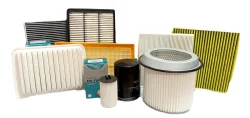Key aspects of car engine oil filters
2024-03-12
Car engine oil filters play a crucial role in maintaining the health and performance of a vehicle's engine. They are designed to filter out contaminants and impurities from the engine oil, ensuring that only clean oil circulates through the engine components. Here are the key aspects of car engine oil filters:
Function:
1. Contaminant Removal: The primary function of an oil filter is to remove contaminants from the engine oil. This includes particles such as dirt, metal fragments, and sludge that can accumulate over time.
2. Protection: By removing impurities, oil filters protect engine components from wear and damage. Clean oil is essential for the longevity and efficient operation of the engine.
Types of Oil Filters:
1. Mechanical (Cartridge) Filters:
- These filters use a replaceable cartridge element made of a porous material, such as paper or synthetic fibers. The cartridge is housed in a metal or plastic casing. When it's time for replacement, only the cartridge is swapped out, and the housing is reused.
2. Spin-On Filters:
- Spin-on filters consist of a metal canister with a built-in filter element. They are easy to install and replace – the entire unit is removed and replaced during an oil change.
3. Magnetic Filters:
- Some oil filters include a magnetic element that attracts and holds onto metal particles. This helps prevent metal debris from circulating through the engine.
4. High-Efficiency Oil Filters:
- High-efficiency filters use advanced materials and design to provide superior filtration. They are often used in high-performance and synthetic oil applications.
Replacement Intervals:
- Oil filters should be replaced regularly during oil changes. The frequency of replacement depends on factors such as the type of oil, driving conditions, and the manufacturer's recommendations. It's common to replace the oil filter every time the oil is changed.
Choosing the Right Oil Filter:
1. Compatibility: Ensure that the oil filter is compatible with your vehicle's make and model. Refer to the owner's manual or consult with the vehicle manufacturer for specifications.
2. Filtration Efficiency: Consider the filtration efficiency of the oil filter. Higher efficiency filters can capture smaller particles, providing better protection for the engine.
3. Quality and Brand: Choose a reputable brand and a high-quality oil filter. Poor-quality filters may not provide adequate filtration and could potentially lead to engine damage.
4. Type of Driving: If you engage in heavy-duty driving conditions, such as towing or off-road activities, you may want to consider a filter designed for such demanding conditions.
Installation:
- When replacing the oil filter, it's essential to follow proper installation procedures. This includes lubricating the rubber gasket on the top of the filter with a small amount of oil and tightening it to the manufacturer's specifications.
Regular maintenance, including timely oil and oil filter changes, is essential for the overall health and longevity of a vehicle's engine. It's important to consult the vehicle's owner's manual and adhere to the manufacturer's recommendations for oil and filter replacement intervals.



